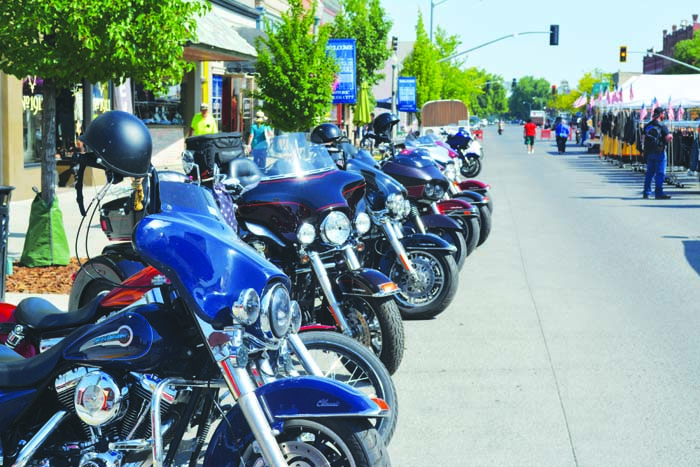Tennis courts aren’t OK with neighbors
Published 12:00 am Monday, August 11, 2003

- Grass courts are a rare treat for tennis players who enter tournaments at the Granger Grass Tennis Courts. Neighbors, however, don't feel the courts meet city zoning standards. (Baker City Herald/Lisa Britton).
By JAYSON JACOBY
Trending
Of the Baker City Herald
A group of residents has asked the Baker City Council to declare Borden and Sandi Granger’s grass tennis courts in violation of the city’s zoning ordinance.
The residents, most of whom live near the Grangers’ four-court complex on Grace Street near the city’s western boundary, contend the courts constitute more than an andquot;accessory useandquot; as the city allows on residential properties.
Trending
Specifically, the group cites tournaments that take place at the courts on about 22 to 27 days per summer. The events attract dozens of players and spectators, some of whom camp overnight on the Grangers’ property.
The Grangers also allow local players to use their courts, for free.
Residents told the council earlier this year that the lights and noise emanating from the property sometimes keep them awake past midnight.
andquot;It’s almost unbearable,andquot; Harold McCormick, one of the residents, told the council this spring.
McCormick was one of nine people who signed a letter asking interim City Manager Tim Collins to decide whether the Grangers’ courts qualify as an accessory use.
The city’s zoning ordinance defines an accessory use as andquot;a use, incidental and subordinate to the main use of the property, located on the same lot as the main use.andquot;
McCormick and his neighbors argue the that the tennis courts, rather than the Grangers’ home, are the main use on the property.
andquot;The question is: ‘Is that thing legal in a medium-density residential zone?’ andquot; McCormick said this morning.
His answer is andquot;no.andquot;
But Collins disagrees.
In his response to the neighbors’ letter, Collins wrote that zoning law treats tennis courts the same as swimming pools as uses andquot;that clearly are secondary to the main purpose of the property as a place for people to reside.andquot;
andquot;If a tennis court is a valid accessory use, four of them would also be unless it becomes clear that the usage of the property is no longer primarily residential but has instead become some sort of recreational site. The fact that people using the courts might be loud and disruptive doesn’t change this fact.andquot;
Collins wrote that the city’s nuisance ordinances deal with noise and lights.
If the City Council concurs with Collins’ interpretation, McCormick and his neighbors could appeal to the Oregon Land Use Board of Appeals.
McCormick said he definitely will appeal if the council agrees with Collins that the tennis courts are an accessory use.
Borden Granger said neither city officials nor any of his neighbors raised the question of accessory uses when he was building the courts several years ago.
He said he and his wife have always strived to minimize the effects on nearby residents.
andquot;As far as I know I’m a good neighbor I try to be,andquot; Granger said. andquot;We never intended it to be a problem for anybody.andquot;
When McCormick and several of his neighbors brought their complaints to the council this spring, both Collins and council member Charles Hofmann said a hearing at LUBA rather than the City Council might be the proper forum to decide the dispute.
Hofmann and a few other councilors said the Grangers’ courts approach the limits of a legal accessory use.
andquot;This certainly is on the border of being more than an accessory use,andquot; Hofmann said this spring.
Instead of deciding the issue this spring, Hofmann proposed and he and his colleagues approved a compromise designed to address the neighbors’ chief complaints.
Elements of the compromise include:
o Lights out, and music turned down, by 10 p.m.
o No new tournaments added to this summer’s list of six, the last being in early September.
o The Grangers apply water or oil to Grace Street to prevent players’ and spectators’ cars from spawning dust clouds.
McCormick said the Grangers have adhered to those requirements.
andquot;It’s not like it was, that’s for sure,andquot; McCormick said.
But he said he still believes the tennis courts exceed the limits of an accessory use.
McCormick also contends the city is setting a potentially troublesome precedent by allowing the Grangers to schedule tournaments at their courts.
He also worries how a future owner might use the courts. The Grangers’ property is for sale.
andquot;Is the city saying that in a medium-density zone you can do just about anything you want to do?andquot; McCormick said.
Granger said the 10 p.m. curfew and other conditions the city imposed have had little effect on the courts.
In the past, only one of the summer tournaments continued much later than 10 p.m. anyway, he said.
Granger said he was pleased to pay to apply dust oil on Grace Street.
andquot;We want to try to prove that we are good neighbors,andquot; he said.









